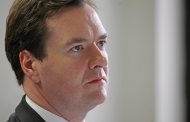Britain's prospects for economic recovery are being "killed off" by the crisis in the eurozone, Chancellor George Osborne has warned.
In a stark message to the leaders of the 17-nation single currency bloc, Mr Osborne said they were facing a "moment of truth" which could determine the future of the entire continent for years to come.
In some of his strongest comments to date, the Chancellor voiced his exasperation at the repeated failure of the eurozone nations to find a permanent solution to end the financial turmoil.
Writing in The Sunday Telegraph he said: "The lesson of the last two years is that treating the latest symptom does not cure the underlying conditions."
While there were signs a solution to the latest bout of uncertainty in the Spanish banking system was on the cards, Mr Osborne said it would not be enough to end the threat to the UK economy.
"Our recovery - already facing powerful headwinds from high oil prices and the debt burden left behind by the boom years - is being killed off by the crisis on our doorstep," he said.
"I know from talking to British businesses that our country is bursting with entrepreneurial spirit and exciting investment plans that are being held back because of uncertainty about the future. That's why a resolution of the eurozone crisis would do more than anything else to give our economy a boost."
He added: "The British Government is clear that it is strongly in Britain's interests for our biggest export market to succeed; the risks for us of a disorderly outcome are huge."
With the prospect of further turmoil in the wake of the of the forthcoming re-run of the Greek elections, the Chancellor called on the eurozone countries to take decisive action to end the instability. He said: "We are approaching a moment of truth for the eurozone. After more than two years of uncertainty, instability and slow growth, decisions taken over the next few months could determine the economic future of the whole European continent for the next decade and beyond."
He again underlined the need for greater fiscal integration - with more pooling of financial resources and the creation of a banking union - across the currency bloc, saying: "The solution in the eurozone doesn't have to be a full-blown United States of the Eurozone, but if it is to be successful it is likely to include most of the mechanisms that make other currencies work."
©Press Association
©Press Association


